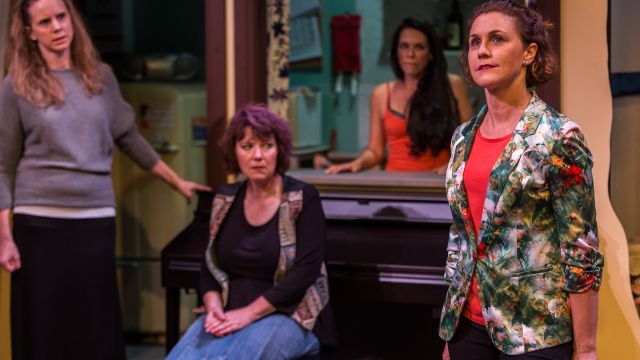Calendar Girls
Director Annette van Roden captures the complexity of this play in these words:
“On the surface, it’s a comedy about a group of women getting nude for a calendar but it’s much more than that. The play is about community, loss, support, acceptance, camaraderie, tolerance and love’.
Tim Firth’s stage adaptation does capture the appeal of the 2003 film of the same name, but he has created a play with many scenes and almost as many costume changes, to say nothing of the props for the calendar shoot. It’s a difficult play, more filmic than theatrical, and requires a great deal of energy and organisation.
As such, it’ a play of challenges for the director, the designers, the stage manager and the actors who, as well as having to “get nude”, have to create together the intimacy of a group of seven women who have forged friendships as members of the local Women’s Institute. Following a shared loss, they take on the task of raising money for a memorial settee in the relatives’ room of the cancer ward of the local hospital.
 The action takes place, predominantly, in a rudimentary church hall, but designer Barry French has cleverly ‘cut out’ the back wall to allow touching outdoor scenes to take place at the foot of a hill onto which changes in the seasons are projected. Lighting by Andrew Kinch highlights the poignancy of these and other moments.
The action takes place, predominantly, in a rudimentary church hall, but designer Barry French has cleverly ‘cut out’ the back wall to allow touching outdoor scenes to take place at the foot of a hill onto which changes in the seasons are projected. Lighting by Andrew Kinch highlights the poignancy of these and other moments.
All of the women have their own little idiosyncrasies, allowing for interesting characterisations. Chris (Megan Hipwell) is the energetic dynamo of the group, quick to make a joke at the expense of their very conservative chairperson, Marie, played by Sandy Velini. Chris is the driving force behind the idea of the calendar. Her close friend, Annie, is played by Leigh Scanlon, who moves from supportive glee to quiet grief with equal poise.
Cora (Margaret Olive) is an outspoken single mum whose daughter has gone in search of the father she has never met, and Jessie (Annette Emerton) is a school teacher nearing retirement but determined not to give in to old age. Jacqui Darbyshire plays Celia, the ‘show pony’ of the group, who is determined not to be put down by the staid ladies of the local golf club.
Faith Jessel finds both comedy and pathos in the character of Ruth, her comic timing making the most of this sweet, accommodating character - especially in the calendar shoot – and her short, sharp scene with make-up artist Elaine, played by Christine Wilson.
 Veteran Pavilion actor and stalwart supporter, Jean Churchward makes a welcome but brief return to the stage as the refined Lady Cravenshire.
Veteran Pavilion actor and stalwart supporter, Jean Churchward makes a welcome but brief return to the stage as the refined Lady Cravenshire.
The four men in the play are not on the stage for long, but their roles compliment the action. Gavin Woodford, as Annie’s ailing husband, finds the depth of love and the acceptance of suffering in his short appearances. Luke Hawkins is remarkably discreet and supportive as the calendar photographer. Todd Beilby plays Chris’ tolerant husband Rod, and Ben Freeman doubles as Liam and the dull guest speaker, Brendan Hulse.
A play such as this is demanding for community theatre. It requires a sound vision, copious time, creative imagination, attention to detail, patient rehearsal, the need for quick changes that don’t affect the pace that the action requires – as well as requiring six brave women to get their gear off in every performance! But, it’s a heart-warming play and this very close, ensemble production will certainly please its audiences.
Carol Wimmer
Photographer: Chris Lundie
Subscribe to our E-Newsletter, buy our latest print edition or find a Performing Arts book at Book Nook.

